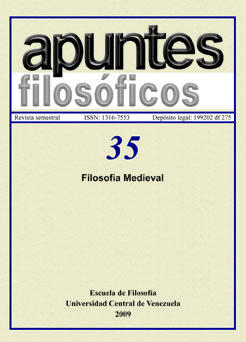Maimónides y Tomás: El triunfo de la negación
Palabras clave:
teología negativa, vía negativa, teología apofática, teología catafática, vía de la eminencia, Negative theology, Negative way, Apophatic theology, Cataphatic theology, Way of eminenceResumen
En este artículo se exploran las relaciones entre finito-infinito y los límites del lenguaje posible, del lenguaje finito, para hablar de su callado fundamento. En este sentido, el mismo vaciamiento del lenguaje, expresión de una imposibilidad a la cual empero no se hurta, la de hablar de Dios, conduce a ponderar la importancia que tiene la teología negativa en el sentido de permitir al mundo humano barruntar las dimensiones del misterio que lo funda. Se tocan, de esta manera, las concepciones de Maimónides y de santo Tomás acerca de la vía negativa como mecanismo parcial que afronta eso que, precisamente, desborda las fronteras del entendimiento humano. No porque Dios, en sí mismo, no sea, por decirlo con Erígena, plus quam esse, hiperesencial, sino porque en la noche cognoscitiva del lenguaje a éste no le queda sino su propia abdicación en relación al telos que lo mueve. En la desproporción existente entre el lenguaje y aquello que lo anima, aquél, el lenguaje, celebrará su propio silencio y la lejanía abismal en relación a su fundamento.
Palabras clave: teología negativa; vía negativa; teología apofática; teología catafática; vía de la eminencia.
Maimonides and Thomas: The Triumph of Negation
Abstract
In this article I explore the finite-infinite relations and the limits of the possible language, of the finite language, in order to speak of its silent foundation. In this regard, the very emptying of language, expression of an impossibility from which it nevertheless does not hide, that of speaking of God, leads to think over the importance that negative theology has, in the sense of allowing the human world to conjecture the dimensions of the mystery on which it is founded. Thus, the conceptions of Maimonides and Saint Thomas are found to be very akin as to their regarding the negative way as a partial mechanism to deal with that which, precisely, surpasses the bounds of human understanding. Not because God in himself is not, to say it with Erigena, plus quam esse, hyperessential, but because in the cognitive night of language the latter has no choice but its own abdication with respect to the telos that animates it. In the disproportion existing between language and that which animates it, the former, language, will celebrate its own silence and the abysmal distance in relation to its foundation.
Keywords: Negative theology; Negative way; Apophatic theology; Cataphatic theology; Way of eminence.

